牛津译林版高中英语选修模块七 牛津英语模块七第三单元Reading教案-新版
牛津高中英语模块七第三单元Reading教学案例设计

牛津高中英语模块三第三单元Back to the pastReading Lost civilizations江苏省沭阳如东中学张长波一、教学内容分析:本案例是牛津高中英语教材模块三第三单元阅读的处理。
本节课是以听、说、读为主的课文理解教学课。
通过听课文,阅读课文和问答对文章进行初步理解。
再通过列表比较和复述课文进一步理解课文,最后通过讨论深化主题。
希望通过该课的学习,学生能够对失落的文明有所了解,并对人类文明的发展及如何保护人类的文化遗产做出探讨,同时培养学生综合运用语言及听说读写的能力。
二、学生学情分析:教学对象为江苏高中一年级下学期学生,学生思维活跃。
高一学生已经初步实现从具体思维向抽象思维的过渡。
他们不满足于教科书上的知识,更希望能学到知识性和趣味性兼有的内容,从英语学习中获得更多的知识和能力。
他们喜欢富有个性化的教学设计,喜欢接受新鲜事物。
他们的学习自主性很强,不再认为英语的课堂学习很枯燥,主动参与到活动中去,成为课堂的主体。
同时他们还主动扩展和利用学习资源(如电脑操作知识),从多渠道获取信息,并能用所获得的信息进行清楚有条理的表达。
因此,设计这节课时,我充分考虑到学生的主体性,充分创造机会让学生拥有成功的喜悦,在和谐的氛围中探究并完成教学任务,让学生主动学习,学有所获。
三、设计思想(Thoughts on the design)Reading主要是了解人类历史上两个非常著名的失落的文明——意大利的庞贝合中国的楼兰。
本文是一片旅行日志,笔者根据自己对教材的理解,紧扣单元主题设计了导入、头脑风暴、快速阅读、仔细阅读、巩固复述、拓展讨论、作业七个环节。
在设计教学的过程中,运用复习‘文明’的定义作为本课的导入,激发学生兴趣。
设计的任务由浅入深,环环相扣,并注重各教学环节的衔接。
在整个教学过程始终贯穿人类文明这条主线,用图片的形式呈现Part B的词汇——温故知新,设计输入,激活记忆,借助于已学过的词汇建立起新旧知识之间的联系。
高中英语 模块7 Unit 3 Reading教学设计 牛津版选修7
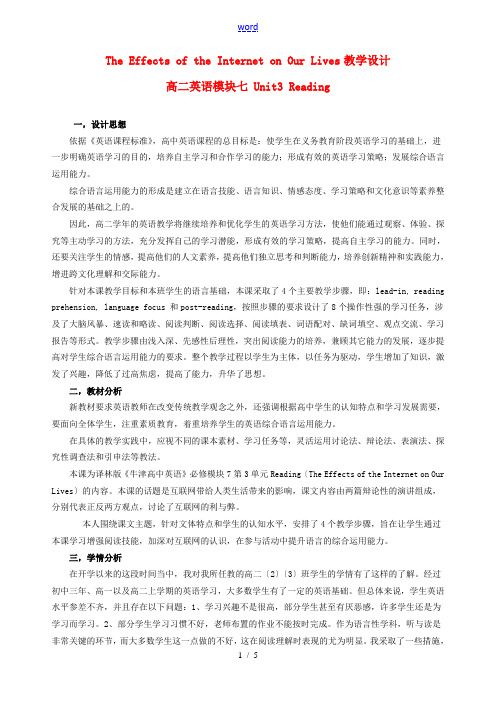
The Effects of the Internet on Our Lives教学设计高二英语模块七 Unit3 Reading一,设计思想依据《英语课程标准》,高中英语课程的总目标是:使学生在义务教育阶段英语学习的基础上,进一步明确英语学习的目的,培养自主学习和合作学习的能力;形成有效的英语学习策略;发展综合语言运用能力。
综合语言运用能力的形成是建立在语言技能、语言知识、情感态度、学习策略和文化意识等素养整合发展的基础之上的。
因此,高二学年的英语教学将继续培养和优化学生的英语学习方法,使他们能通过观察、体验、探究等主动学习的方法,充分发挥自己的学习潜能,形成有效的学习策略,提高自主学习的能力。
同时,还要关注学生的情感,提高他们的人文素养,提高他们独立思考和判断能力,培养创新精神和实践能力,增进跨文化理解和交际能力。
针对本课教学目标和本班学生的语言基础,本课采取了4个主要教学步骤,即:lead-in, reading prehension, language focus 和post-reading,按照步骤的要求设计了8个操作性强的学习任务,涉及了大脑风暴、速读和略读、阅读判断、阅读选择、阅读填表、词语配对、缺词填空、观点交流、学习报告等形式。
教学步骤由浅入深、先感性后理性,突出阅读能力的培养,兼顾其它能力的发展,逐步提高对学生综合语言运用能力的要求。
整个教学过程以学生为主体,以任务为驱动,学生增加了知识,激发了兴趣,降低了过高焦虑,提高了能力,升华了思想。
二,教材分析新教材要求英语教师在改变传统教学观念之外,还强调根据高中学生的认知特点和学习发展需要,要面向全体学生,注重素质教育,着重培养学生的英语综合语言运用能力。
在具体的教学实践中,应视不同的课本素材、学习任务等,灵活运用讨论法、辩论法、表演法、探究性调查法和引申法等教法。
本课为译林版《牛津高中英语》必修模块7第3单元Reading〔The Effects of the Internet on Our Lives〕的内容。
高中英语牛津模块七Unit-3-reading课件选修7
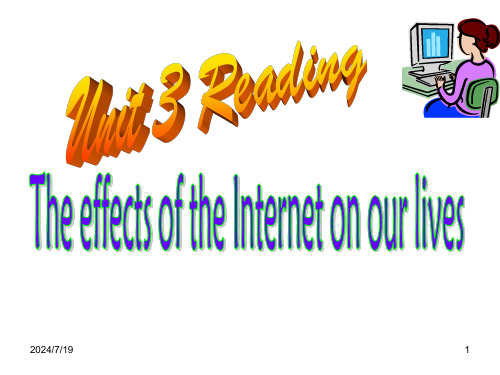
The main points:
1. uncontrolled information 2.the change in the way people spend their time
2024/7/19
the supporting facts;
the supporting facts;
the opposite point
Para 3 the opposite point;
the supporting facts;
Para 4 the second point ; Para 3 the second point ;
2024/7/19
13
Supporting facts:
1) In 2003, 70 per cent of eBay’s problems were with people who sold things that did not exit, or who lied about the products they were selling.
2024/7/19
1
1. Do you use the Internet? What do you usually use it for?
2. Is it good or bad to use the Internet?
2024/7/19
2
Read the text quickly to find some general information. 1.How many passages are there in the text?
最新牛津译林版高中英语选修七unit 3《the world online》reading1教案.doc

Unit3 The world online Reading1教学设计单元:Unit 3 The world online板块:Reading 1Thoughts on the design本节课是阅读教学,主要目的是指导学生有效地阅读辩论类的文章,并通过对文章的阅读获取必要的信息,帮助学生更好地评价因特网的影响,理解如何去适当地使用因特网的资源。
教学过程中,通过对课文内容相关练习的设计,帮助学生逐步加深对课文的理解以及对辩论类文章结构的掌握。
最后辩论部分的设计是要帮助学生进一步巩固课文的内容,并且让学生学会使用文章中所出现的结构及形式进行辩论,达到学以致用的目的。
Teaching aims:After learning this period, the stud ents will be able to:1.understand the argument about the positive and negative effects ofthe Internet on people’s lives;2.learn about the strategy of “reading an argument”;3.retell the effects of the Internet and debate about a certain subject.Step 1 Lead-in1. Begin the class by discussing some problems about the Internet …(PPT 4-9)(1)What do you usually use the Internet for?(Gather di fferent answersto the questions and show some pictures about the functions of the Internet: to search for information, to help with study, to play game and download some music and video, for amusement and shopping)(2)What do you think the most important benefit of the Internet is?(Ithas brought us much convenience; it help us to save much time, energyas well as money.)(3)Do you think there are any negative things about the Internet?(Givethe students a few minutes to discuss with their classmates and then ask some to list their opinions)2. From your answers, we can find that some students think it has good effects; some others think it’s bad. That’s what we will mainly learn today. Now please turn to page 34 and let’s learn the passage about the Internet.[Explanation]第一步的设置主要为激发学生对于本节课的兴趣,由于因特网是学生生活中很熟悉的话题,所有绝大多数学生有话可说,并由此话题自然地引入课文,从而充分调动学生的学习热情和兴趣。
译林牛津模块7 Unit 3 Language points for Reading(译林牛津版高二
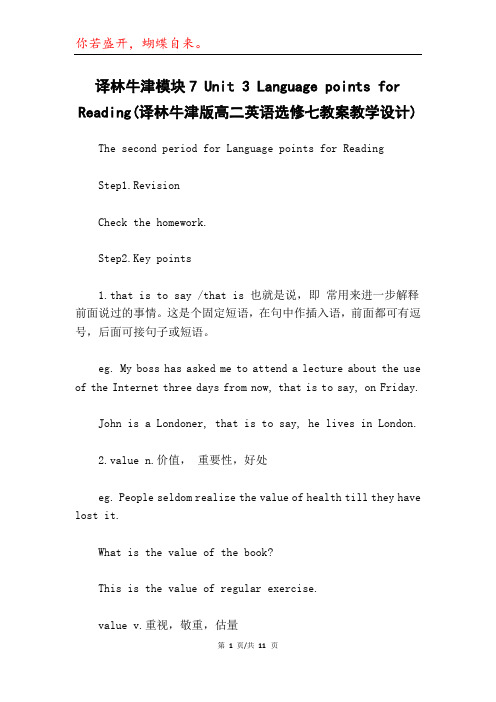
译林牛津模块7 Unit 3 Language points for Reading(译林牛津版高二英语选修七教案教学设计)The second period for Language points for ReadingStep1.RevisionCheck the homework.Step2.Key points1.that is to say /that is 也就是说,即常用来进一步解释前面说过的事情。
这是个固定短语,在句中作插入语,前面都可有逗号,后面可接句子或短语。
eg. My boss has asked me to attend a lecture about the use of the Internet three days from now, that is to say, on Friday.John is a Londoner, that is to say, he lives in London.2.value n.价值,重要性,好处eg. People seldom realize the value of health till they have lost it.What is the value of the book?This is the value of regular exercise.value v.重视,敬重,估量eg. I’ve always valued your friendship/your advice. The Ss have always valued their teachers.The machine is valued at 1,000 yuan.3.form v.形成,构成,养成,想出,成立eg. Five colleges formed the university.Water forms almost three quarters of the human body. Clouds are forming on the top of the hill.form a /the habit form in line in the form ofform n.外形,形状,形式eg. She has a tall graceful form.These are two different forms of the same thing.4.in need of 需要中的,需要。
牛津译林版高中英语选修模块七牛津英语模块七第三单元Reading教案-新版
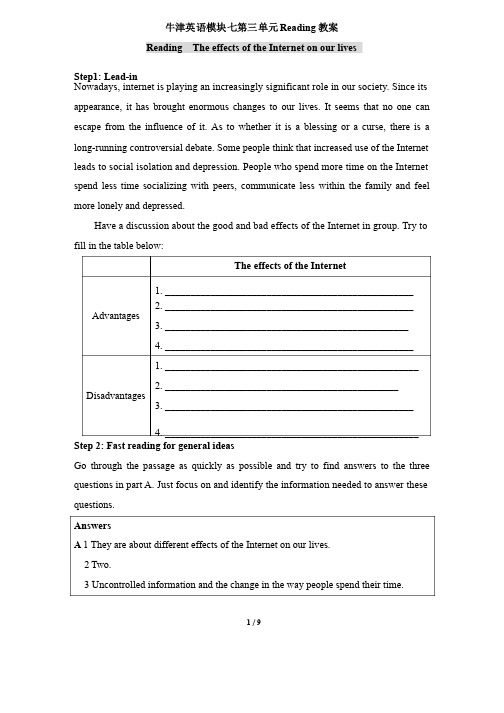
牛津英语模块七第三单元Reading教案Reading The effects of the Internet on our livesStep1: Lead-inNowadays, internet is playing an increasingly significant role in our society. Since its appearance, it has brought enormous changes to our lives. It seems that no one can escape from the influence of it. As to whether it is a blessing or a curse, there is a long-running controversial debate. Some people think that increased use of the Internet leads to social isolation and depression. People who spend more time on the Internet spend less time socializing with peers, communicate less within the family and feel more lonely and depressed.Have a discussion about the good and bad effects of the Internet in group. Try to fill in the table below:The effects of the InternetAdvantages 1. _________________________________________________2. _________________________________________________3. ________________________________________________4. _________________________________________________Disadvantages 1. __________________________________________________2. ______________________________________________3. _________________________________________________4. __________________________________________________Step 2: Fast reading for general ideasGo through the passage as quickly as possible and try to find answers to the three questions in part A. Just focus on and identify the information needed to answer these questions.AnswersA 1 They are about different effects of the Internet on our lives.2 Two.3 Uncontrolled information and the change in the way people spend their time.1 / 9Step 3: Detailed reading for important information1. Let’s read the passage a second time and complete Parts C1 and C2. AnswersC1 1 against 2 for 3 against 4 for 5 for 6 againstC2ArgumentsThe Internet is a great help to people who are in need of various information.People use the Internet to build social ties.The amount of false information on the Internet becomes more of a problem everyday.S pending too much time building relationships on the Internet can damage people’sabilities to live normal lives.2. Read the text again and choose the best answers according to the text:⑴ According to the survey, children use the Internet mostly to __________.A. chatB. play gamesC. help with their studiesD. advance knowledge about hobbies⑵ What is the most important thing in building a friendship?A. common interestsB. appearanceC. ageD. popularity⑶ What is the worst problem of eBay?A. false informationB. people don’t know how to use a computerC. things selling on the Internet don’t existD. people are used to the traditional ways of buying⑷ The clinic was opened to____________.A. help people surf the InternetB. be an Internet caféC. make people spend their time with their familyD. help people who are addicted to computer gamesKeys:(1)-(4) CAADNow, read the Reading strategy on page 35. Pay attention to how to read an argument, especially, how to find each side’s view, how to find a list of points, and what each side believes. Read the passage again and try to fill in the table below.Debaters Main points Supporting facts ConclusionsZhu Zhenfei the Internet’svalue forpeople who arelooking forinformationA recent survey done in the USAshowed that 80 percent of frequentusers use it mainly to search foranswers to questions, and that 79percent said their second mostcommon use of the Internet is toadvance their knowledge abouthobbies;The Internetremains a positivetool that helpsmake our livesbetter.the Internet’sability to buildonline groupsand formfriendshipswhich theInternet givesus1.Internet friendships are based oncommon interests, rather thanappearance, age or popularity;2. People who are disabled and muststay in their homes cancommunicate with the outside worldand meet others with similarinterests;Lin Lei uncontrolledinformation 1. In 2003, eBay said that 70 percent of their problems were with people who sold things that did not exist, or who lied about the products they were selling; 2. University professors around the world complain that students are handing in papers using false information they found on theInternet;It remains important for useither to limit ouruse of the Internet,or to learn how tohandlethe problems it hascaused. the change in the way people spend their time 1. Some families spend their timeapart, because one or more membersare using the computer, or are at anInternet caféInternet café; ;2. One university did a study aboutthe students who had stopped theirstudies before completing a diplomacourse, and found that 43 percent ofthem were heavy computer users;Step 4: Practice:1. Now let’s complete Part D on page 36.AnswersD 1 f 2 b 3 a 4 g 5 c 6 d 7 h 8 e2. A university student sent an e-mail to his mother. Read it in Part E and fill in the blanks with words given in the box.AnswersE (1) Internet (2) debate (3) speakers (4) experts(5) social ties (6) heavy (7) aspect(8)up-to-date(9) disabled (10) statisticsStep 5: Post-reading activities1. Pair work:What do you know about the Internet? Try to find as much information as you can, and report your information to your partner.For referenceThe Internet is a giant network of computers located all over the world that communicate with each other.The Internet is an international collection of computer networks that all understand a standard system of addresses and commands, connected together through backbone systems. It was started in 1969, when the U.S. Department of Defence established a nationwide network to connect a handful of universities and contractors. The original idea was to increase computing capacity that could be shared by users in many locations and to find out what it would take for computer networks to survive a nuclear war or other disaster by providing multiple paths between users. People on the ARPNET (as this nationwide network was originally called) quickly discovered that they could exchange messages and conduct electronic “conferences”with distant colleagues for purposes that had nothing to do with the military industrial complex. If somebody else had something interesting stored on their computer, it wasa simple matter to obtain a copy (assuming the owner did not protect it).Over the years, additional networks joined which added access to more and more computers. The first international connections, to Norway and England, were added in 1973. Today thousands of networks and millions of computers are connected to the Internet. It is growing so quickly that nobody can say exactly how many users “On the Net”.The Internet is the largest repository of information which can provide very large network resources. The network resources can be divided into network facilities resources and network information resources. The network facilities resourcesprovide us the ability of remote computation and communication. The network information resources provide us all kinds of information services, such as science,education, business, history, law, art, and entertainment, etc.The goal of your use of the Internet is exchanging messages or obtaining information. What you need to know is that you can exchange message with other computers on the Internet and use your computer as a remote terminal on distant computers. But the internal details of the link are less important, as long as it works. If you connect computers together on a network, each computer must have a unique address, which could be either a word or a number. For example, the address of Sam’s computer could be Sam, or a number.The Internet is a huge interconnected system, but it uses just a handful of method to move data around. Until the recent explosion of public interest in the Internet, the vast majority of the computers on the Net use the Unix operating system. As a result, the standard Unix commands for certain Internet services have entered the online community's languages as both nouns and verbs to describe the services themselves. Some of the services that the Internet can provide are: Mail, Remote use of another computer (Telnet), File Transfer (FTP), News, and Live conversation.The most commonly used network service is electronic mail (E-mail), or simply as mail. Mail permits network users to send textual messages to each other. Computers and networks handle delivering the mail, so that communicating mail users do not have to handle details of delivery, and do not have to be present at the same time or place.The simplest way to access a file on another host is to copy it across the network to your local host. FTP can do this.Presently, a user with an account on any Internet machine can establish a liveconnection to any other machine on the Net from the terminal in his own office or laboratory. It is only necessary to use the Unix command that sets up a remote terminal connection (Telnet), followed by the address of the distant machine.Before you can use the Internet, you must choose a way to move data betweenthe Internet and your PC. This link may be a high-speed data communication circuit, a local area network (LAN), a telephone live or a radio channel. Most likely, you will use a Modem attached to your telephone line to talk to the Internet. Naturally, the quality of your Internet connection and service, like many other things in life, is dictated by the amount of money that you are willing to spend.Although all these services can well satisfy the needs of the users for information exchange, a definite requirement is needed for the users. Not only should the users know where the resources locates, but also he should know some operating commands concerned to ease the searching burden of the users, recently some convenient searching tools appears, such as Gopher, WWW and Netscape.World wide web (www) is a networked hypertext protocol and user interface. It provides access to multiple services and documents like Gopher does but is more ambitious in its method. A jump to other Internet service can be triggered by a mouse click on a "hotlinked" word, image, or icon on the Web page.As more and more systems join the Internet, and as more and more forms of information can be converted to digital form, the amount of stuff available to Internet users continues to grow. At some points very soon after the nationwide (and later worldwide) Internet started to grow, people began to treat the Net as a community, with its own tradition and customs. For example, somebody would ask a question in a conference, and a complete stranger would send back an answer: after the same question were repeated several time by people who hadn’t seen the original answers, somebody else gathered list of "frequently asked questions" and placed it where newcomers could find it.So we can say that the Internet is your PC’s window to the rest of the world.2. Group work:Undoubtedly, in the future, the Internet will still play a very important role in human’s life. B life. But they’ll certainly be advanced than those of today. Let’s work in groups and ut they’ll certainly be advanced than those of today. Let’s work in groups and guess how we can use the Internet in the future.3. Let’s come to Part F. Work in pairs and share your opinions with each other.4. Discussion: Does the Internet do us good or bad? Step 5: Language points:VocabularyWordspositive, analysis, value, affair, forecast, package,click, acquire, downtown, sort, leader, skeptical,frequent, advance, statistics, tie, common,appearance, popularity, background, lifelong,moreover, remain, drawback, address, accurate,advantage, disadvantage, judge, false, troublesome,occur, private, gain, addicted, diploma, course,heavy, handle, present, dynamic, evident, explicit,alarm, relevant, dull, appreciationUsefulexpressionsspeak for, that is to say, have an effect on, in needof, current affairs, travel package, turn to, focus on,rather than, all sorts of, such as, pros and cons, beaccustomed to, worn out, keep…in mind,Sentence patterns 1 With the touch of a button or the click of a mouse,a student can acquire knowledge from the information held in the largest libraries andmuseums in the world, whether he or she lives in a small village or downtown in a big city.2 The second most common use of the Internet,according to 79 per cent of the survey respondents,is to advance knowledge about hobbies.3 Without the Internet, these people would havefewer chances of meeting people.4 I feel it remains important for us either to limit our use of the Internet, or to learn how to handle the problems it has caused.Step 6: Homework:1. Read the text again and again. Try to memorize the language points.2. Do Parts A1 and A2 on pages 118 of the Workbook.。
高中英语_unit3_reading教案2_牛津译林版高二选修7
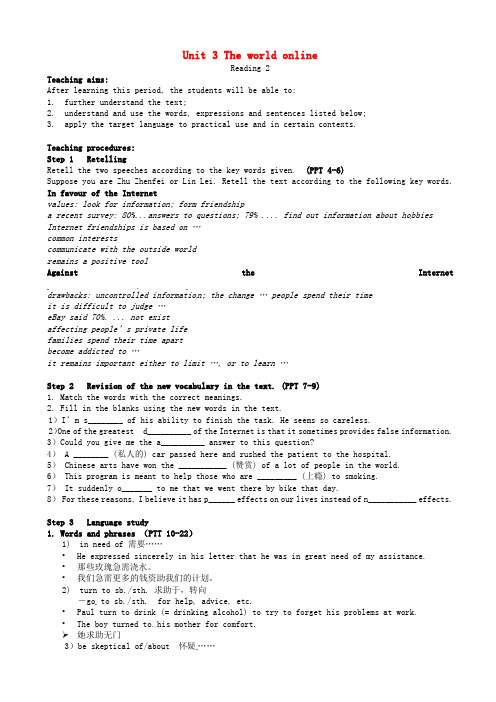
Unit 3 The world onlineReading 2Teaching aims:After learning this period, the students will be able to:1.further understand the text;2.understand and use the words, expressions and sentences listed below;3.apply the target language to practical use and in certain contexts.Teaching procedures:Step 1 RetellingRetell the two speeches according to the key words given. (PPT 4-6)Suppose you are Zhu Zhenfei or Lin Lei. Retell the text according to the following key words.In favour of the Internetvalues: look for information; form friendshipa recent survey: 80%...answers to questions; 79% ....find out information about hobbiesInternet friendships is based on …common interestscommunicate with the outside worldremains a positive toolAgainst the Internet drawbacks: uncontrolled informatio n; the change … people spend their timeit is difficult to judge …eBay said 70%. ... not existaffecting people’s private lifefamilies spend their time apartbecome addicted to …it remains important either to limit …, or to learn …Step 2 Revision of the new vocabulary in the text. (PPT 7-9)1. Match the words with the correct meanings.2. Fill in the blanks using the new words in the text.1)I’m s________ of his ability to finish the task. He seems so c areless.2)One of the greatest d__________ of the Internet is that it sometimes provides false information.3)Could you give me the a__________ answer to this question?4) A ________ (私人的) car passed here and rushed the patient to the hospital.5) Chinese arts have won the ___________ (赞赏) of a lot of people in the world.6) This program is meant to help those who are _________ (上瘾) to smoking.7) It suddenly o_______ to me that we went there by bike that day.8) For these reasons, I believe it has p______ effects on our lives instead of n___________ effects.Step 3 Language study1. Words and phrases (PTT 10-22)1)in need of 需要……•He expressed sincerely in his letter that he was in great need of my assistance.•那些玫瑰急需浇水。
高中英语 Unit3 Welcome to the unit教案 牛津译林版选修7-牛津版高二选修7
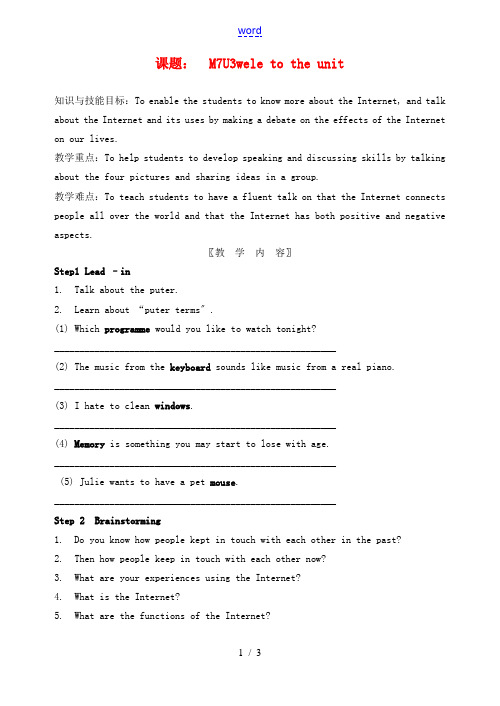
课题: M7U3wele to the unit知识与技能目标:To enable the students to know more about the Internet, and talk about the Internet and its uses by making a debate on the effects of the Internet on our lives.教学重点:To help students to develop speaking and discussing skills by talking about the four pictures and sharing ideas in a group.教学难点:To teach students to have a fluent talk on that the Internet connects people all over the world and that the Internet has both positive and negative aspects.〖教学内容〗Step1 Lead –in1. Talk about the puter.2. Learn about “puter terms〞.(1) Which programme would you like to watch tonight?________________________________________________________(2) The music from the keyboard sounds like music from a real piano.________________________________________________________(3) I hate to clean windows.________________________________________________________(4) Memory is something you may start to lose with age.________________________________________________________(5) Julie wants to have a pet mouse.________________________________________________________Step 2 Brainstorming1. Do you know how people kept in touch with each other in the past?2. Then how people keep in touch with each other now?3. What are your experiences using the Internet?4. What is the Internet?5. What are the functions of the Internet?Step 3 Sharing informationDiscuss the four pictures of the poster “A world of connections〞. Encourage students to express their understanding about the different usages of the Internet and have a good imagination of what the Internet brings us in the future.Now work in pairs and have a discussion about each of the pictures.Picture 11. What can people do on this website?________________________________________________________2. What do we call this kind of website that provides searching services?________________________________________________________3. How can you find information on the Internet using a search engine?________________________________________________________Picture 21. What do you think would be the advantages of shopping online?________________________________________________________2. What do you think would be the disadvantages of online shopping?________________________________________________________Picture 31. Have you ever tried talking with your parents or friends online?________________________________________________________2. What devices do you need if you want to talk with people online?________________________________________________________3. What are the good points and bad points of online talking?________________________________________________________Picture 41. Have you tried other online services that are not mentioned here? Which ones? ________________________________________________________2. What other online services do you think we will need or have in the future? ________________________________________________________3. What role do you think the Internet will play in the future?________________________________________________________4. Do you think it is a good idea to ‘live’ on the Internet pletely? ________________________________________________________。
译林牛津模块7Unit3Reading(语言点)(译林牛津版高二英语选修七教案教学设计)
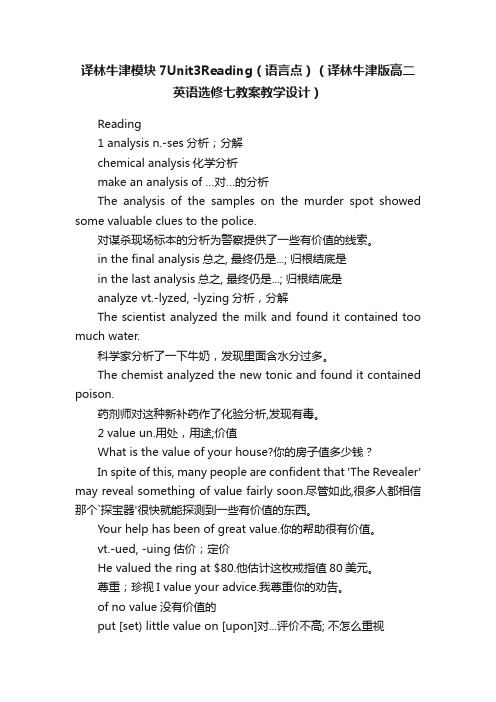
译林牛津模块7Unit3Reading(语言点)(译林牛津版高二英语选修七教案教学设计)Reading1 analysis n.-ses分析;分解chemical analysis化学分析make an analysis of …对…的分析The analysis of the samples on the murder spot showed some valuable clues to the police.对谋杀现场标本的分析为警察提供了一些有价值的线索。
in the final analysis总之, 最终仍是...; 归根结底是in the last analysis总之, 最终仍是...; 归根结底是analyze vt.-lyzed, -lyzing分析,分解The scientist analyzed the milk and found it contained too much water.科学家分析了一下牛奶,发现里面含水分过多。
The chemist analyzed the new tonic and found it contained poison.药剂师对这种新补药作了化验分析,发现有毒。
2 value un.用处,用途;价值What is the value of your house?你的房子值多少钱?In spite of this, many people are confident that 'The Revealer' may reveal something of value fairly soon.尽管如此,很多人都相信那个`探宝器'很快就能探测到一些有价值的东西。
Your help has been of great value.你的帮助很有价值。
vt.-ued, -uing估价;定价He valued the ring at $80.他估计这枚戒指值80美元。
牛津译林版高中英语选修七M7U3reading.ppt(2MB)

_________________ use _?________________ _________________ Why_?________________
Group work: List as many points as you can to support your opinion.
Competition 5:
The 2nd speech
Statement: ..negative effects … Point 1: Too much unevaluated information Supporting facts: ➢true and accurate information ? ➢ shopping problems on eBay ➢false information in papers
①②
①
①
③
④ ②③ ④ ② ③④
⑤
⑤
⑤
A
B
C
(2nd speech) Draw the diagram of the structure by yourself
① ② ③ ④ ⑤
Competition 2
Group-work
--- Get each debater’s ① statement ② points ③ supporting facts ④ conclusion
高中英语课件
(金戈铁骑 整理制作)
Module 7 Unit 3
The world online
Reading
Brainstorming:
What can we do through the Internet?
Module 7 Unit 3
The effects of the Internet on our lives
牛津英语模块七第三单元Reading精品教案1

牛津英语模块七第三单元Reading精品教案1Topic : Reading (1)Unit 3 Reading period 1Teaching aims :To help the students know some background knowledge about theInternet technology .To learn some vocabulary about the Internet .To read a debate about the effects of the Internet on our lives . Teaching important pointsTo read the passage and get a general idea of it byFast reading .To finish C1 and C2 by careful reading .Teaching difficult points :To master the skills of reading a debateTeaching methods :Reading discussion practicingTeaching procedures :Step one : Greetings and revisionGreet the whole class as usual .Revise the new words in reading and try to get students to read them correctly and know their meanings .Step two : Lead—inYesterday we mainly talked about the convenience the Internet hasbrought to us . But do you think it always bring us good things ?(No.) Although it can give us much convenience , it can also havesome badeffect on us .Yes , can you give me someExamples of the two effects the Internet has on our daily lives .(Give the students a few minutes to discuss with their classmates and then ask some to list their opinions .) From your answers , we can find that some students think it has good effects ; some think it’s bad .That’s what we will mainly learn today .Now please turn to page 34 and let’s learn the reading strategy first .Step three : Reading strategyReading an argumentWhen you read an argument , you must remember that a speview is being given . If you know what to look for , you can be a better judge of whether the argument is well made .First know what the argument is about .Then find a list of the points the person wants or make or individual sub-arguments 。
- 1、下载文档前请自行甄别文档内容的完整性,平台不提供额外的编辑、内容补充、找答案等附加服务。
- 2、"仅部分预览"的文档,不可在线预览部分如存在完整性等问题,可反馈申请退款(可完整预览的文档不适用该条件!)。
- 3、如文档侵犯您的权益,请联系客服反馈,我们会尽快为您处理(人工客服工作时间:9:00-18:30)。
牛津英语模块七第三单元Reading 教案
Reading The effects of the Internet on our lives
Step1: Lead-in
Nowadays, internet is playing an increasingly significant role in our society. Since its appearance, it has brought enormous changes to our lives. It seems that no one can escape from the influence of it. As to whether it is a blessing or a curse, there is a long-running controversial debate. Some people think that increased use of the Internet leads to social isolation and depression. People who spend more time on the Internet spend less time socializing with peers, communicate less within the family and feel more lonely and depressed.
Have a discussion about the good and bad effects of the Internet in group. Try to fill in the table below:
Step 2: Fast reading for general ideas
Go through the passage as quickly as possible
and try to find answers to the three questions in part A. Just focus on and identify the information needed to answer these questions.
Step 3: Detailed reading for important information
1. Let’s read the passage a second time and complete Parts C1 and C
2.
2. Read the text again and choose the best answers according to the text:
⑴ According to the survey, children use the Internet mostly to __________.
A. chat
B. play games
C. help with their studies
D. advance knowledge about hobbies
⑵ What is the most important thing in building a friendship?
A. common interests
B. appearance
C. age
D. popularity
⑶ What is the worst problem of eBay?
A. false information
B. people don’t know how to use a computer
C. things selling on the Internet don’t exist
D. people are used to the traditional ways of buying
⑷ The clinic was opened to____________.
A. help people surf the Internet
B. be an Internet café
C. make people spend their time with their family
D. help people who are addicted to computer games
Now, read the Reading strategy on page 35. Pay attention to how to read an argument, especially, how to find each side’s view, how to find a list of points, and what each side believes. Read the passage again and try to fill in the table below.
Step 4: Practice:
1. Now let’s complete Part D on page 36.
2. A university student sent an e-mail to his mother. Read it in Part E and fill in the blanks with words given in the box.
Step 5: Post-reading activities
1. Pair work:
What do you know about the Internet? Try to find as much information as you can, and report your information to your partner.
2. Group work:
Undoubtedly, in the future, the Internet will still play a very important role in human’s life. B ut they’ll certainly be advanced than those of today. Let’s work in groups and guess how we can use the Internet in the future.
3. Let’s come to Part F. Work in pairs and share your opinions with each other.
4. Discussion: Does the Internet do us good or bad? Step 5: Language points:
Step 6: Homework:
1. Read the text again and again. Try to memorize the language points.
2. Do Parts A1 and A2 on pages 118 of the Workbook.。
